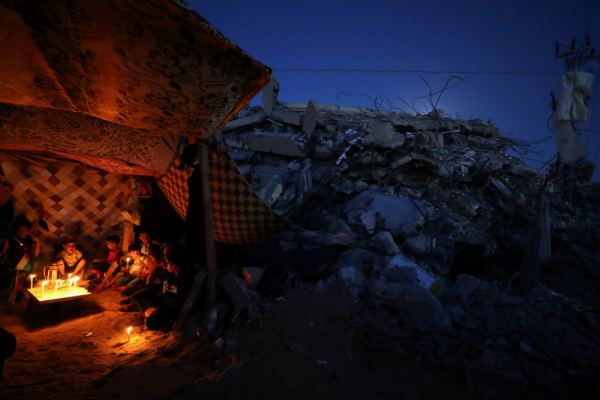My professors in journalism school taught me to avoid passive voice as often as possible. They taught me that passive voice gets in the way of giving readers a clear view of who did what. Passive voice may be innocuously overlooked in many instances (for example, in this sentence, I didn’t tell you who was doing the overlooking), but more often using it risks confusion and obscurity — and these aren’t exactly journalistic values.
When we do find passive voice in news coverage, it sticks out. Especially when journalists use passive voice — or other constructions that obscure culpability — to describe state violence both at home and abroad.
Consider this Reuters headline published on May 15, during the height of Israel and Hamas’ 11-day war:
“Gaza tower housing AP, Al Jazeera collapses after missile strike: witness.” This headline still appears in reposts of the newswire’s original story.
In this headline, the subject is “tower” and the action is “collapses;” the important detail that the collapse was the result of a missile strike is buried at the end of the headline where — as online editors should know — it is more likely to get cut off when shared on social media platforms. Most importantly, the headline removes culpability from Israel by failing to mention that Israel shot the missiles and collapsed the towers. While readers might correctly assume that the missiles struck the building and caused it to collapse, proper headlines don’t force readers to make assumptions.
Reuters later updated the headline to: “Israel destroys Gaza tower housing AP and Al Jazeera offices.” The second headline, correctly, names the actor (Israel) and the action (destruction of the Gaza building) without ambiguity or obfuscation.
This instance isn’t an outlier. In the United States, journalists routinely absolve or obscure police violence with headlines like “Handcuffed Man William Green Fatally Shot Inside Prince George’s County Police Ofc. Michael Owen’s Cruiser.”
I believe these failures are a microcosm of the ways that journalists, historically, have failed our communities by submitting our values to the status quo of white supremacy. And for too long, institutional media has ignored marginalized people who offered us prophetic correction.
Why do journalists go to such efforts to ignore or introduce passive construction? Ricardo Sandoval-Palos, the public editor at PBS, told Sojourners that some journalists use passive voice because they’re working to avoid legal terms, like murder, which can land a news outlet with lawsuits if used incorrectly. Over time, using ambiguous constructions to describe when police kill people has become “the accepted exception to the desire to have as active a voice as possible,” he said.
This explains why journalists shy away from words or phrases with legal meanings, but it fails to account for why we don’t use active voice with legally neutral words like “kill.” According to Sandoval-Palos, journalists also resort to passive construction because of an ingrained deference to authorities — resulting in a failure to verify what the police tell us — or simply failing to take “the necessary, extra steps ... that would allow you to be able to accurately describe something in the more active voice.”
After years of ignoring community members who proclaimed the truth, journalists are beginning to accept that police lie.
“Man dies after medical incident during police interaction,” is how the Minneapolis Police Department described Derek Chauvin murdering George Floyd in a May 26, 2020 news statement. Louisiana Police lied to Ronald Greene’s family, saying that he died after crashing his car during a police chase; released footage showed that they tazed, punched, and dragged him before his death. Buffalo Police lied to the public and said Martin Gugino “was injured when he tripped & fell;” bystander footage showed two officers shoving Gugino.
What should place the fear of God in journalists is the knowledge that — in instances lacking video — we will never know when our lazy repetition of “official reports” deceived our community. The stark contrast in epistemology matters: A historically white press learned that police lie because of video evidence; communities that have been subject to police violence knew police lie because they are lied to and lied about.
The job of a journalist is to verify what we’re told, regardless of the source. For too long we’ve elevated the testimony of police as more reliable testimony and contributed to the baffling notion that police are more intrinsically moral or honest than other people.
“In my mind, that kind of passivity, and leaving it to the cops to tell us what’s going on, has become a bit of a detriment to our work,” Sandoval-Palos said. “As journalists we need to keep all these institutions to account.”
False pursuits of objectivity
Journalists often use the passive voice construction in their pursuits of “objectivity,” which the industry has upheld as the gold standard of “good” journalism in the United States for over a hundred years; the argument is that objective, unbiased coverage is more authoritative and reliable.
I commend the goal of producing news coverage that is accurate and fair. But it’s wrong to think journalism can achieve a neutral, cold, reporting unconnected from the social and political factors that form us as individuals and newsrooms. Who we choose to interview, what quotes we include, when we release a story, and how we write it are all examples of editorial decisions that are subject to bias and opinion.
Trust in journalism is dwindling; regaining trust will not mean doubling down on policies and procedures that are currently failing us. Editors and reporters should work to recognize the ways our biases affect our coverage so that we can communicate those with our readers and build a trust set upon the foundation of transparency.
This is reflected in Sojourners’ editorial policies and procedures. As a Christian organization with commitments to justice, we know that “our writers have a point of view, and we insist that they be accurate in their reporting and analysis; rigorous, comprehensive, and ethical in their methods; and transparent with readers about how they have arrived at their conclusions.”
I do not wish to see any publication become explicitly partisan — that carries its own dangers. But we ought to question whether objectivity is a goal worth pursuing. As a journalist, I was taught that aiming for objectivity — even if an unachievable goal — would help us achieve better coverage. I find it more likely that this approach provides cover for the status quo by baptizing hegemonic beliefs as “objective.”
Sixty years ago, in Wretched of the Earth, Frantz Fanon critiqued Western journalists who pursued “objectivity” to the detriment of marginalized people.
“Now, when a journalist from the West asks us questions, it is seldom in order to help us,” wrote Fanon. “In the Algerian war, for example, even the most liberal of the French reporters never ceased to use ambiguous terms in describing our struggle.” Fanon then makes an observation that is as prescient today as it was in 1961: “When we reproached them for this, they replied in all good faith that they were being objective. For the native, objectivity is always directed against [them].”
The issue of objectivity is more than just what we pursue, but who is pursuing it. As Wesley Lowery wrote in The New York Times last summer: “[The] mainstream has allowed what it considers objective truth to be decided almost exclusively by white reporters and their mostly white bosses. And those selective truths have been calibrated to avoid offending the sensibilities of white readers.”
People from communities that have not largely experienced the violence of the carceral system — and in fact have been beneficiaries of racist policing and prisons — have little reason to doubt the veracity of police stories. Newsrooms overrepresented by those afforded political and social power are unable to avoid error of judgement in their news coverage.
“[The] way we look at objectivity, the way we look at communities of color, I think it’s all tied together,” Sandocal-Palos said.
I believe there is potential for a great shift in journalism, and readers can help bring about this shift by holding us accountable.
Feedback is “critical to the work we do as journalists,” Sandoval-Palos said in our interview.
If we want journalism to move away from white supremacy, among other evils, those of us who are reporters and editors must learn to be members of our community, formed and informed by perspectives we have often ignored.
Sojourners' own policy and procedures updates have been influenced by community accountability when we failed. Our ethics policy, intentionally, is a living document, “updated from time to time, based on feedback from our journalists, from our readers, and from our perceptions of our changing needs.” My request to you, our community, is that you send us genuine feedback that invites conversation.
And my request to my fellow journalists is that we not overlook feedback simply because it comes with passion or anger. We have spent decades overlooking genuine feedback. The anger, passion, and frustration we face for our failures are righteous and genuine. Instead of becoming defensive, we can learn and grow.
Got something to say about what you're reading? We value your feedback!





